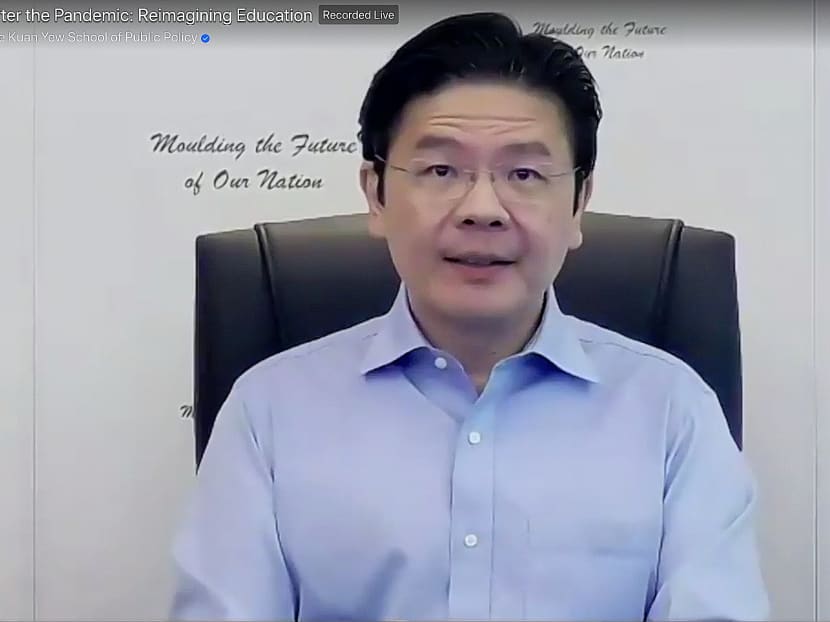Universities, polytechnics, ITEs reviewing curriculum for a ‘new way’ of teaching, learning: Lawrence Wong
SINGAPORE — All universities are reviewing their curriculum, Education Minister Lawrence Wong said on Friday (Sept 25), with similar reviews happening in polytechnics and Institutes of Technical Education (ITEs) as the authorities rethink how education can be better delivered and academic silos can be broken down.

Education Minister Lawrence Wong speaking during a Facebook Live session titled After the Pandemic: Reimagining Education, which is part of the Lee Kuan Yew School of Public Policy’s Asia Thinker Series.
- A push for interdisciplinary learning is a change that is going to happen, Education Minister Lawrence Wong said
- This is to encourage adaptability and agility of mindsets
- MOE hopes to work “blended learning” or a “hybrid model” into the education system starting next year
- There are downsides to leaning on technology and there is a need to be mindful of its impact on young children, he said
SINGAPORE — All universities are reviewing their curriculum, Education Minister Lawrence Wong said on Friday (Sept 25), with similar reviews happening in polytechnics and Institutes of Technical Education (ITEs) as the authorities rethink how education can be better delivered and academic silos can be broken down.
The National University of Singapore (NUS) on Tuesday disclosed that it has preliminary plans to set up a new college for students admitted to the Faculty of Arts and Social Sciences and the Faculty of Science, as part of its push for interdisciplinary learning.
Mr Wong was speaking during a Facebook Live session titled After the Pandemic: Reimagining Education, which is part of the Lee Kuan Yew School of Public Policy’s Asia Thinker Series.
He was joined by Associate Professor Suzaina Kadir, vice-dean of academic affairs at Lee Kuan Yew School of Public Policy, and Mr Brajesh Panth, the chief of the education sector group at Asian Development Bank.
One challenge in changing the curriculum, Mr Wong said, is getting professors across the different faculties to start thinking afresh on how best teaching and learning can be done. These professors may be very used to doing things in a certain way.
A push for interdisciplinary learning is also a change that is going to happen.
“One thing that we are trying… the university leadership is trying very hard to do, is to break down some of these academic silos and encourage a more multi-disciplinary approach, especially in the early years of an undergraduate’s education journey, to provide them a broader base of learning.
“Single specialisation is still important, but I think a lot of the research shows that the more exposure a student has, in terms of different disciplines, it really encourages adaptability and agility of mindsets… In the real world, many, many issues are complex and cut across different disciplines that cannot be solved by an engineer alone or an architect, or a scientist. It really needs different skill sets to come together,” Mr Wong added.
‘TREMENDOUS POTENTIAL’ FOR ONLINE LEARNING
While the closure of schools during the circuit breaker in April and May to restrict activities and curb the spread of Covid-19 may have disrupted learning, it showed “tremendous potential” for online learning, Mr Wong noted.
The Ministry of Education (MOE) now has a “renewed interest” in the role of technology in education, he said.
“And it goes beyond just putting some content online and having remote learning. There is a lot of potential, for example, in using data analytics and artificial intelligence to allow for automated grading. And you can do a lot to have better assessments of how every student is doing.”
That is not to say technology can replace human interactions because teaching and learning ultimately remain social and relational processes.
He spoke about the idea of “blended learning” or a hybrid model that MOE hopes to work into the education system starting next year.
“Blended learning sounds very easy to do… (but it’s) more than just saying, ‘Let's have one day a week of learning from home... It really requires a rethink of pedagogy and instructional design, and how best to integrate digital devices.
“It also requires teachers and instructors to come alongside and be trained in this new way of teaching,” he said.
There are downsides to leaning on technology and there is a need to be mindful of its impact on young children. This was why when MOE decided to introduce the use of digital devices for every student, they started with secondary school pupils, Mr Wong said.
“(There) are concerns about excessive screen time, digital addiction and (the students’) mental well-being… And a lot of research has shown that for young children, you get better outcomes from face-to-face learning rather than learning from the screen.”
PRIVATE SECTOR FIRMS PLAY DUAL ROLE
Mr Wong was asked at the session about the extent to which the private sector should be involved in the provision of education, particularly when education is looked at as a public good.
The private sector can play two very important roles, Mr Wong said. Firstly, it could provide “very useful inputs” to polytechnics and universities to help these institutions understand better what the industry demands and needs to shape the curriculum to be more industry-relevant.
Secondly, private sector companies could be training providers, training not just their own employees but for the whole industry.
“And so, the Government — in our case, the SkillsFuture agency — partners these companies to develop training programmes, and these are very useful, because there is no one better to understand and to know what the training and needs are than the company itself that’s in the industry,” he added.
‘LEARNING FOR GOOD’
In his closing remarks, Mr Wong said it is important that education equips an individual with all the necessary skills, both the technical know-how as well as the soft skills, in order to do better in life and to apply them in the workplace.
However, there is a “higher-order goal”.
“(It’s) that learning can be for good. We also want to learn to be better human beings, to be better husbands and wives, to be better fathers and mothers to our children, and to just lead more fulfilling lives.
“So, this idea of learning for good transcends every job, whatever job you're doing — have that mindset of wanting to be a better person, wanting to do better in everything that you do. And that, ultimately, I think, is what education is about.”











